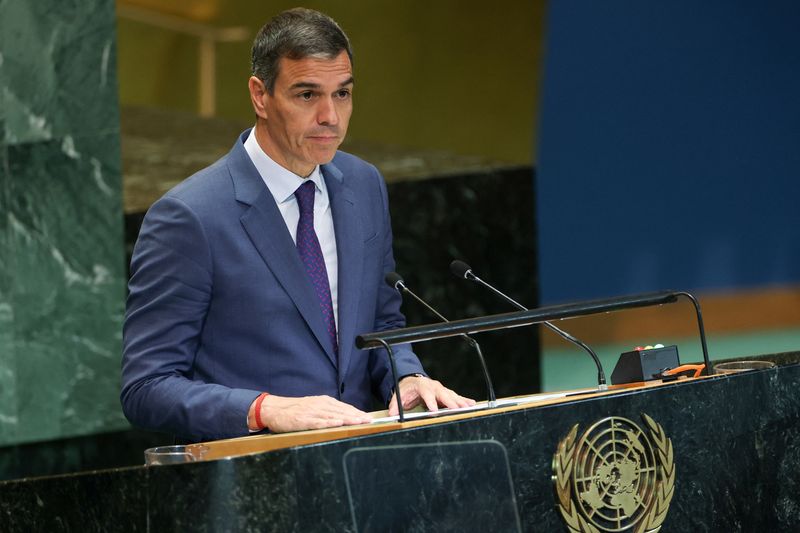MADRID (Reuters) - Prime Minister Pedro Sanchez on Wednesday announced measures to make it easier for immigrants to settle in Spain, championing migration and its economic benefits even as other European governments have tightened their borders against newcomers.
To stop undocumented migrants, Germany, Slovakia and Hungary have reintroduced temporary border controls in what was long the heart of the European Union's Schengen open travel zone. France says it is considering similar moves while Italy aims to set up detention camps in non-EU Albania for migrants picked up at sea.
"(Immigration is) not just a question of humanitarianism..., it's also necessary for the prosperity of our economy and the sustainability of the welfare state," Sanchez said in a speech to parliament. "The key is in managing it well."
Spain will work on making it easier for migrants to come with a series of initiatives, including recognising academic qualifications for temporary workers, simplifying contracts as part of a new labour migration programme, and reducing red tape for residency applications, Sanchez said.
Spain's economy is the fastest growing in the EU, boosted in part by a wave of skilled immigrants from Latin America who have plugged labour shortages in sectors such as technology and hospitality.
Sanchez, head of Spain's Socialist party, said low-skilled migrants also helped the economy, working in "invisible jobs". Without them, he said, sectors such as construction, agriculture and hospitality would collapse.
Elsewhere in the 27-nation EU the mood has turned increasingly hostile to migration, with growing popular support for conservative and far-right parties seeking tougher controls.
Ahead of a summit next week, 17 EU member states called on the European Commission last week to sharpen EU rules on returning irregular migrants to their home countries.
Sanchez said Spain would ask the European Commission to advance by one year to 2025 the launch of a migration pact that would have EU member states share the distribution of migrants and asylum seekers based on GDP, population and other criteria.
ANTI-IMMIGRANT FEELING RISING IN SPAIN
Even in Spain, however, anti-immigrant sentiment is growing. A recent poll published by El Pais newspaper found 57% thought there were too many immigrants in the country.
Such views drive a recent rise in support for far-right parties to 15.4%, according to another poll for El Pais.
Far-right leader Santiago Abascal said migration was causing a rise in violent crime and straining social services.
"They tell us that there is a need for immigrant labour, but they hide from us that young Spanish workers often have to leave Spain to make ends meet," Abascal said.
While Spain's unemployment rate is at its lowest since 2008, it remains among the highest in Europe, especially among youths.
Sanchez said that only 6% of migrants enter Spain illegally, most of them arriving by sea from West Africa via the Canary Islands. Some 30,808 migrants arrived in the Canaries by sea on precarious fishing boats in the first nine months of 2024, according to Interior Ministry data, more than twice as many as in the same period last year.
He called on political opponents to negotiate on sharing the burden for accepting unaccompanied minors among Spain's autonomous regions, and rejected a proposal to increase monitoring of the sea.
"The right wants the navy to stop helping shipwrecks and dedicate itself to sinking them," Sanchez said. "Sending frigates against boats is just that."

But Alberto Nunez Feijoo, leader of the opposition conservative People's Party, criticised Sanchez for his lack of action on the Canary Islands migration crisis.
"There is no more inhumane migration policy than the one that does not exist. Every boat that leaves for Spain, endangering lives, is a failure of your government," he said.